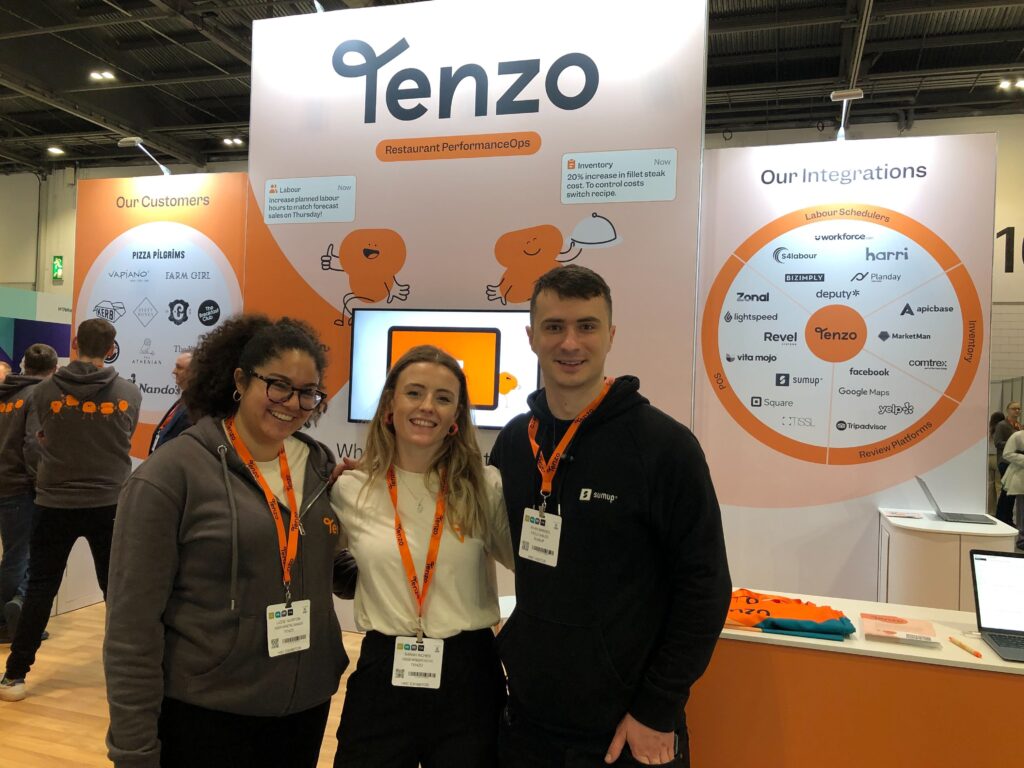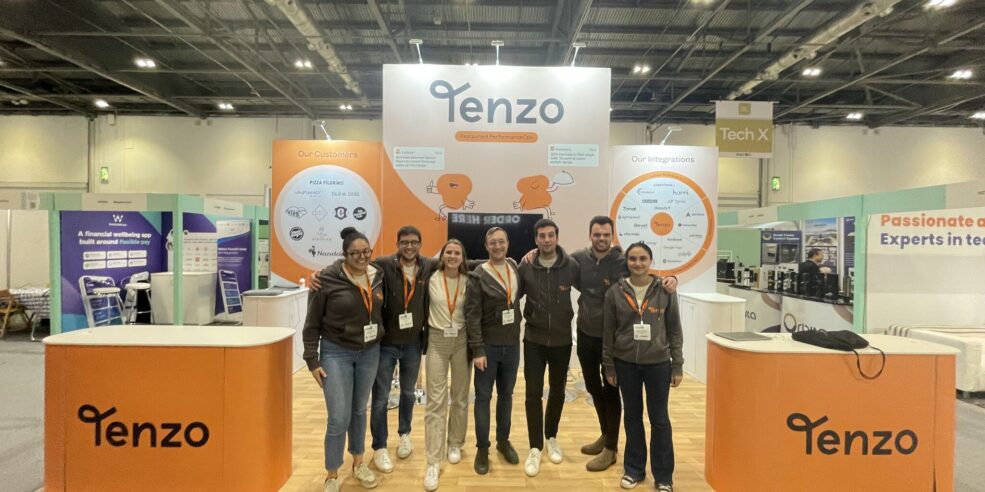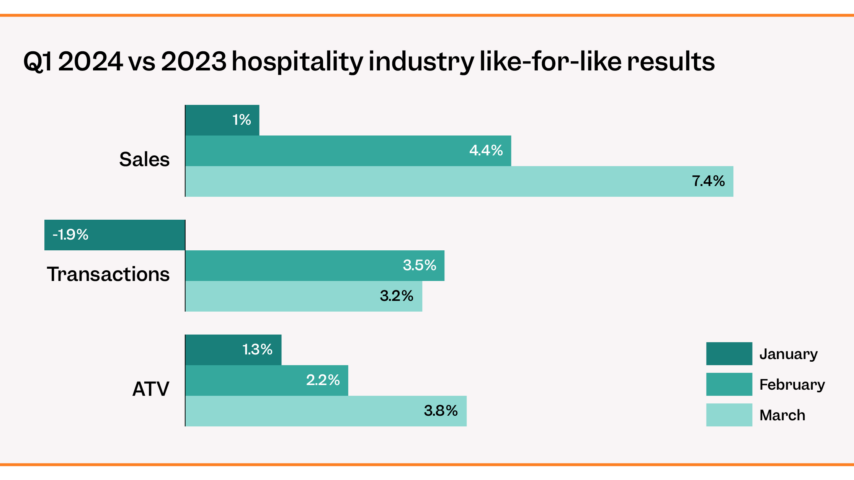The Tenzo team spent a few days at Hotel, Restaurant & Catering (HRC) in March. Hosted at the ExCel Centre in East London, we got to chat with some of our partners and customers as well as a lot of new faces!
Attending also had the added benefit of hearing from some of the best in the industry – learning about new practices and technologies within the restaurant industry.
We thought we’d pull together everything we found out over the three days – here’s what we learnt!
Our top learnings from HRC to drive restaurant performance
Improving Employee Retention
Craig Prentice, the founder of mum, chatted with Olajibe Alabi and Kerry Crompton who work in people and well-being at Turtle Bay and The Compass Group, respectively.
Everyone knows staff turnover and labour shortages are prevalent issues within the restaurant industry at the moment, with 34% of restaurants in the UK experiencing struggles with retaining staff, but the speakers had some great advice for retaining the talent you have.
Here are some of our key takeaways from the talk:
- The first 6 months are the key focus when trying to improve your employee retention – it is the make-or-break period for most staff; and the time when turnover is the highest.
- Invest in employer branding, It is a candidate’s market, and you need to use it to sell your brand – showing you’re the best possible employer. Gen Z are more likely to work somewhere they feel shares their values.
- Engage with your staff and understand what they would like as part of benefits packages, or before moving forward with initiatives. They can be expensive to implement, so understanding what would stand out to prospective candidates and your current employees is really useful – this goes a long way in fostering trust.
The Digital Worker
Aneesh Gupta, the Founder and Managing Director of Centelli, led discussions with Neil Cryer, from Village Hotels, and Melanie Cole from the Clermont Hotel Group on how digital workers can improve efficiency and reduce the workload for overstretched staff.
Some of their top tips were:
- When implementing new technologies, start small and build up from there.
- Staffing shortages make automation a solution and give staff time to focus on tasks that bring value to your guests, and therefore business.
- New technologies can be met with resistance; ensure there are champions within your business that are on board with the latest ideas: their enthusiasm makes the entire team’s transition easier.
- Customers are often unaware of automation processes altering their experience, whilst the operators have access to all the benefits.
- Systems can work for 24 hours, meaning there aren’t any missed opportunities.
Building a Sustainable Future
Robert Richardson, the CEO of the Institute of Hospitality, led a talk with Andrew Coney, Erin Ling, Daniel Pedreschi, and Tej Wallia (from The Hari Hotel Belgravia, University of Surrey, PPHE Hotel Group, and Foxhills Club and Resort respectively).
Key points of their discussion on how technology can help build a more sustainable industry included:
- Take into account the social impact of implementing new processes.
- Use consultants, who have experience working with operators, to ensure that you make the changes most suitable for your business.
- Training is vital in ensuring the success of new rollouts, staff not properly trained result in increased costs and reduced sustainability – they can also damage the assessment of new technologies.
- Factor in energy usage as part of staff bonuses, at the newest PPHE hotel they managed to save 34% on energy costs with incentives to reduce usage.

Dark Kitchens
Chris Joliffe and Joe Heather, from Kobas and Deliverect respectively, discussed the shifting definition of dark kitchens. Previously they were thought to be one kitchen cooking for multiple delivery brands, but now, many restaurants are using dark kitchens to facilitate the growth of their brand.
Some of our key takeaways included:
- Increasing consumer intelligence, and awareness of spending, is pushing the quality of deliveries to improve, promoting this shift in dark kitchen usage.
- Dark kitchens can add incremental revenue to your business, using the excess capacity within the current restaurant kitchen space and employees to provide external income.
- Using your main restaurant as a central production kitchen and outsourcing the finishing processes is crucial to the success of expansion. It ensures the continuity of the brand and the quality of food whilst taking advantage of the already strong team in place.
- You generally have 6 weeks to ensure success with dark kitchens, use your data and technology to make sure every single order is high quality.
- If you’re starting a brand from scratch, focus on what you have a passion and drive for.
Tech for Pubs
The CEO of BII (The British Institute of Innkeeping), Steve Alton, led discussions on how technology should be higher up the priority list to help overstretched pubs and bars. He was joined by Mark Robson, Director of New Dawn Pubs, Mark Holden, a BII ambassador and the director of Inn Cornwall, and Tom Brady; the Co-Founder of GigRealm.
Food and energy are crucial parts of business for restaurants and pubs, and inflation is causing booming costs. This, alongside increasing labour costs, means that there are lower profit margins.
Some of the key points of discussion when considering technologies were:
- Identify the need first and then find solutions to plug it in that will make a difference.
- Find different data solutions that will integrate and talk to each other, allowing for a more holistic understanding of your business.
- Think about, and make sure, you’re improving the customer journey or the efficiency of your business with every tech addition.
- Voltage management systems can help to control energy consumption, and manage costs in real-time – this saved New Dawn Pubs around 15%.
- Installing solar panels is a great way to inject sustainable energy into your business, and save costs. Inn Cornwall installed over 40 solar panels, and in some months this saved them 19%.
Return on Investment in ESG
Domini Hogg, the Founder of Tried and Supplied led the discussion with members of the audience on measuring return on investment for introducing sustainable processes.
Key points of discussion included:
- Implementing sustainable processes takes time, and results take even longer, making measurable ROI challenging.
- Looking at ESG investments as part of a marketing strategy, tapping into consumers’ drive to be more sustainable is useful. Use it as part of a long-term brand awareness investment, rather than an immediate increase in revenue.
- There’s a huge amount of value in consumers’ understanding of the farm-to-fork journey. Provide emotive supplier stories, with sustainable messaging, helping to drive a passion for the product.
- Make information accessible to consumers with QR codes on menus, or links on your website championing your primary suppliers.

Marketing with a Budget
Gemma Rollason, Partnerships and Fundraising Manager at Hospitality Rising led the talk with the Founders of The Burnt Chef Project, The Love Your Pub Group, and Fired Up Collective.
Key takeaways from their discussion included:
- Government support for businesses in the UK is ending, and due to inflation, it leaves businesses in a worse position than during the pandemic.
- Marketing can be an area that many restaurants feel does not need a budget, so being able to market on a budget is really valuable.
- Social media is one of the easiest ways to drive traffic to your restaurant, but it can be time-consuming. Be omnipresent and use every communication tool possible.
- Pull on varying demographics within your team for ideas, and use them to find how to best resonate with your target audience.
- Optimise your SEO to boost customer numbers. Write blogs to increase website traffic; promote the industry, suppliers and venues. Be relatable to consumers and industry professionals, without trashing the industry.
- Be adaptable and make changes to always stay relevant. Change graphics and copy of adverts to keep things interesting.
- Follow the data, and understand what works best for you by looking at the trends.
Conclusion
It was great to hear from so many amazing speakers at HRC 2023. Restaurant performance is always at the forefront of Tenzo’s mind; so hearing about successful initiatives from operators to combat the constant new challenges in the hospitality industry is always a great opportunity.
Focussing on all aspects of your business, from marketing and ESG to employee retention and technologies; keeping an eye on what other businesses are doing helps you to stay ahead of the challenges, and boost performance.





